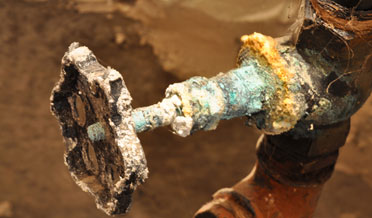The Benefits of Repiping for Better Water Quality and Efficiency
Vintage homes are often beautiful, charming, and architecturally quirky; we love them for this. They are also ongoing history lessons in construction methods and materials, often demonstrating what NOT to use and how NOT to build. That is pretty evident in the plumbing materials found in old homes, even homes in this area. Some material choices are unfortunate; other choices are hazardous to health and need to be changed. Many times old pipes and material choices are a common reason to consider repiping the home.
Cast Iron Pipes
Cast iron can be found in homes built before the 1980s when it was replaced by copper. Cast iron was relatively cheap, durable (because it was thick), and lasted long. However, it was also prone to rust (imagine that) and scaling of mineral salts. Calcium and other minerals reacted to the iron molecules, which promoted rust and created the potential for blockage. Leaks in cast iron sewer pipes allow roots from shrubs and trees to rapidly fill the pipe and create backups.
If your vintage home has cast iron pipes that have not begun to leak, request a plumber to inspect exposed samples. Repiping them before they leak might be a prudent decision.
Galvanized Pipes
Galvanized pipes were developed to replace lead water pipes. Between 1920 and 1960, manufacturers dipped steel pipes in molten zinc to create a “galvanized” coating to protect pipes against rust. But there were two problems: the coating released zinc, lead, and cadmium into the water and the pipes still leaked. The coating still attracted the minerals in the water, creating scaling and blockages.
If your vintage home has galvanized pipes, even pipes in good condition, they should be replaced to increase the safety of your family’s drinking water.
Lead Pipes (Yikes!!)
People knew that lead caused sickness in Roman times, but it was still used for delivering drinking water from the early 1800s until 1960 when lead was replaced by copper. Believe it or not, lead was not banned for water supply purposes until 1986, leading to the contamination of the water supply in several major cities.
Lead is known to cause neurological problems. It first manifests itself in our most vulnerable family members, the very young and the very old, but everyone is susceptible. If your vintage home has lead pipes they need to be replaced as soon as possible.
Polybutylene Pipes
Another experiment gone awry was polybutylene, an inexpensive, flexible, plastic that seemed ideal for residential water lines. But just a little more research should have been done before installation began. It seems that chlorine compounds cause this plastic to degrade and develop microfractures. Municipalities add chlorine to the public water supply to kill pathogens and apparently, to dissolve polybutylene pipes.
There is good news and bad news if you find polybutylene pipes in your home.
- The good news is that it is not hazardous
- The bad news is that it is only a matter of time before the leaks begin.
Bad plumbing material in an older home may create insurance nightmares and may also be a barrier to reselling a home. Repiping options include:
- Polyvinyl Chloride, a synthetic plastic resin made from the polymerization of vinyl chloride, is commonly available and used in modern construction. It is durable but rather rigid.
- Chlorinated polyvinyl chloride is a very similar plastic that can withstand high pressure and temperature. It is slightly more flexible than PVC.
- Cross-linked polyethylene or PEX, is an extruded polymer that remains flexible (it is sold in coils).
- Copper is also a great choice for domestic water supply lines. It does not rust and is resistant to scaling. It is durable and flexible.
Doctor Cool Repiping Services Can Help with Your Pipe Replacement Needs
Repiping your home is a crucial step for improving water quality and ensuring efficient plumbing, especially in vintage houses with outdated materials. Many older homes feature cast iron, galvanized, lead, or polybutylene pipes, which can pose health risks, cause leaks, and lead to costly repairs. By replacing these outdated materials with modern options like PVC, CPVC, PEX, or copper, Doctor Cool has been helping homeowners enhance safety, increase property value, and prevent plumbing-related problems. Call us today at 281-338-8751.

